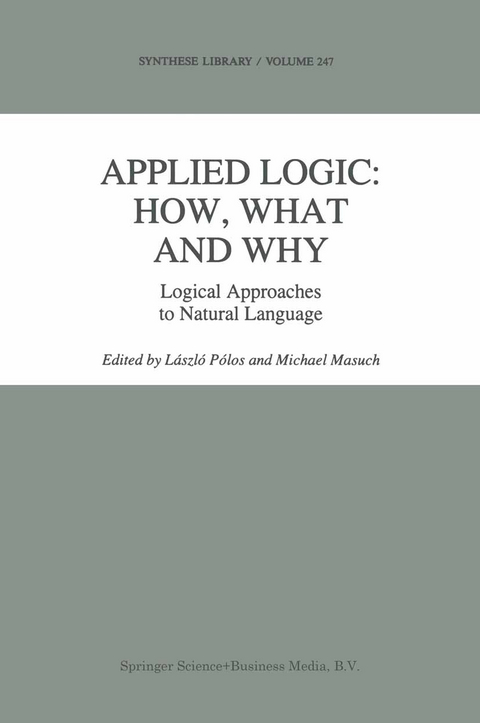
Applied Logic: How, What and Why
Logical Approaches to Natural Language
Seiten
2010
|
Softcover reprint of hardcover 1st ed. 1995
Springer (Verlag)
978-90-481-4536-2 (ISBN)
Springer (Verlag)
978-90-481-4536-2 (ISBN)
A selection of papers presented at the international conference `Applied Logic: Logic at Work', held in Amsterdam in December 1992. Nowadays, the term `applied logic' has a very wide meaning, as numerous applications of logical methods in computer science, formal linguistics and other fields testify. Such applications are by no means restricted to the use of known logical techniques: at its best, applied logic involves a back-and-forth dialogue between logical theory and the problem domain.
The papers focus on the application of logic to the study of natural language, in syntax, semantics and pragmatics, and the effect of these studies on the development of logic. In the last decade, the dynamic nature of natural language has been the most interesting challenge for logicians. Dynamic semantics is here applied to new topics, the dynamic approach is extended to syntax, and several methodological issues in dynamic semantics are systematically investigated. Other methodological issues in the formal studies of natural language are discussed, such as the need for types, modal operators and other logical operators in the formal framework. Further articles address the scope of these methodological issues from other perspectives ranging from cognition to computation.
The volume presents papers that are interesting for graduate students and researchers in the field of logic, philosophy of language, formal semantics and pragmatics, and computational linguistics.
The papers focus on the application of logic to the study of natural language, in syntax, semantics and pragmatics, and the effect of these studies on the development of logic. In the last decade, the dynamic nature of natural language has been the most interesting challenge for logicians. Dynamic semantics is here applied to new topics, the dynamic approach is extended to syntax, and several methodological issues in dynamic semantics are systematically investigated. Other methodological issues in the formal studies of natural language are discussed, such as the need for types, modal operators and other logical operators in the formal framework. Further articles address the scope of these methodological issues from other perspectives ranging from cognition to computation.
The volume presents papers that are interesting for graduate students and researchers in the field of logic, philosophy of language, formal semantics and pragmatics, and computational linguistics.
Pragmatic Reasoning. A Model-Based Theory.- Verb-Phrase Ellipsis in Dynamic Semantics.- Optimization of Deduction for Multi-Modal Logics.- Are Types Needed for Natural Language?.- Indexical Dynamics.- Implicit and Explicit Definability in Modal and Temporal Logics.- Evolving Algebras and Mathematical Models of Language.- Information States in Situation Theory.- Logic Finite Automata.- Dynamic Aspect Trees.- Logic as a Foundation for a Cognitive Theory of Modality Assignment.- Meeting a Modality? Restricted Permutation for the Lambek Calculus.- Update Semantics for Propositional Texts.
| Erscheint lt. Verlag | 15.12.2010 |
|---|---|
| Reihe/Serie | Synthese Library ; 247 |
| Zusatzinfo | VIII, 392 p. |
| Verlagsort | Dordrecht |
| Sprache | englisch |
| Maße | 152 x 229 mm |
| Themenwelt | Geisteswissenschaften ► Philosophie ► Allgemeines / Lexika |
| Geisteswissenschaften ► Philosophie ► Erkenntnistheorie / Wissenschaftstheorie | |
| Geisteswissenschaften ► Philosophie ► Logik | |
| Geisteswissenschaften ► Philosophie ► Sprachphilosophie | |
| Geisteswissenschaften ► Sprach- / Literaturwissenschaft ► Sprachwissenschaft | |
| Informatik ► Theorie / Studium ► Künstliche Intelligenz / Robotik | |
| Sozialwissenschaften | |
| ISBN-10 | 90-481-4536-8 / 9048145368 |
| ISBN-13 | 978-90-481-4536-2 / 9789048145362 |
| Zustand | Neuware |
| Informationen gemäß Produktsicherheitsverordnung (GPSR) | |
| Haben Sie eine Frage zum Produkt? |
Mehr entdecken
aus dem Bereich
aus dem Bereich
Buch | Softcover (2024)
REDLINE (Verlag)
20,00 €
Eine kurze Geschichte der Informationsnetzwerke von der Steinzeit bis …
Buch | Hardcover (2024)
Penguin (Verlag)
28,00 €


